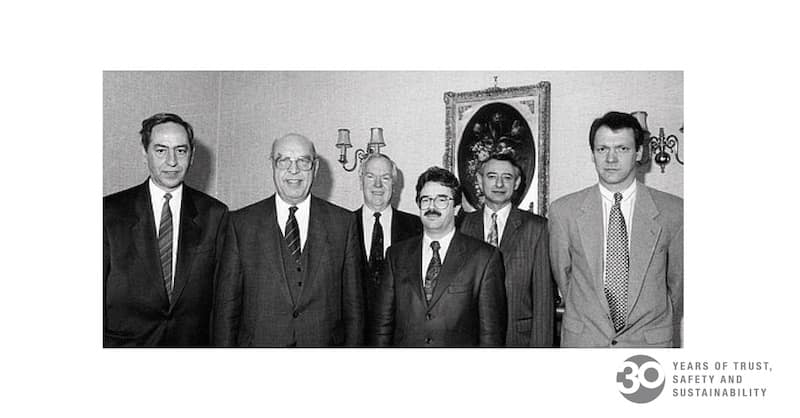Interview with OETI’s OEKO-TEX® expert Helene Melnitzky about the role of OEKO-TEX®, market trends and current OEKO-TEX® licenses and labels as OEKO-TEX® turns 30 this year
The international OEKO-TEX® Association, which consists of a total of 17 independent research and testing institutes in Europe and Japan, turns thirty this year. As one of the founding members, OETI is taking this as an opportunity to interview OEKO-TEX® expert Helene Melnitzky (Head of the Ecology Department at OETI) about the role of the OEKO-TEX® Association, market trends and current OEKO-TEX® certifications and labels.

The international OEKO-TEX® Association is celebrating its thirtieth anniversary this year. What role has it played so far with regard to the product safety of textile and leather products?
Product safety with STANDARD 100 by OEKO-TEX® and LEATHER STANDARD by OEKO-TEX®
In this area, OEKO-TEX® has had a great impact over the last three decades by ensuring certain pollutant additives, some of which were found in large quantities in textiles 30 years ago, no longer exist.
The OEKO-TEX® Association was also the first to limit certain heavy metals. Based on our actions, legal provisions were ultimately passed. We have been testing banned dyes since before there even was an EU regulation in this regard. Of course, we now test according to the EU regulation, but in this respect OEKO-TEX® was a clear trailblazer.
Environmentally friendly products manufactured under fair working conditions and environmentally friendly production sites with STeP by OEKO-TEX®
In addition to product safety, OEKO-TEX® has been working on the topics of ‘environmentally friendly textile products manufactured under fair working conditions for 30 years, which also included leather products for the last five years, and with STeP by OEKO-TEX® on the ‘certification of environmentally friendly production sites’ since 2013. I
n one way or another, we have been preparing the market for thirty years. In the process, we are always creating new things: currently the Impact Calculator and, in autumn 2022, a new certification for brands and retailers: RESPONSIBLE BUSINESS by OEKO-TEX®
Voluntary tool for STeP by OEKO-TEX® customers: Impact Calculator
STeP-certified businesses can now use this tool on a voluntary basis to calculate their carbon and water footprint.
How does that benefit our customers?
Customers can use these calculations for external communication to demonstrate on their products or web pages that their products have a lower footprint than their competitors. This means that customers sourcing everything regionally will have a smaller footprint than companies that source products from different countries. In the future, it will be necessary to display the water and carbon footprint on the product, so that consumers can decide whether they want to buy product A or B.
Fair working conditions
This topic has also been gaining significant momentum over the last ten years. There is now enough pressure on brands and retailers to improve local working conditions. We cover this area as part of our STeP by OEKO-TEX® certification with our ‘social responsibility’ module. (Note: the STeP by OEKO-TEX® certification includes the modules Chemical Management, Environmental Performance,
Environmental Management, Quality Management, Occupational Health and Safety, and
Social Responsibility).
In other words, the advantage for our customers is that they can subsequently use the MADE IN GREEN by OEKO-TEX® label to show how they have performed in the social module.
Transparency with MADE IN GREEN by OEKO-TEX®
Because everything that is written on the product is transparent.
The MADE IN GREEN by OEKO-TEX® label is a traceable product label for all types of textiles and leather items that have been produced in environmentally friendly factories and at safe and socially responsible workplaces. Furthermore, the MADE IN GREEN by OEKO-TEX® label gives consumers the certainty that the textile or leather product is made from materials tested for harmful substances.
In order to ensure that textile or leather products with the MADE IN GREEN by OEKO-TEX® label have been produced using environmentally friendly processes under socially acceptable working conditions, manufacturing and wet production sites must be certified according to STeP by OEKO-TEX®.
Recycling
Recycled materials in STANDARD 100 by OEKO-TEX®
For a year now, it has been possible to have recycled materials STANDARD 100 certified and display that certification as a hangtag to communicate that the product consists of a certain proportion of recycled materials. To qualify, the product must contain at least 20 per cent recycled material.
Which market demand is this certification addressing?
There is an increasing demand that at least part of the product must be made from recycled material. This is partly attributable to market pressure because raw materials are scarce and expensive. However, we are also voluntarily informing consumers about recycling as part of the circular economy.
Outlook
Producing textile and leather products in a more environmentally friendly and fair manner, while making the value chain more transparent, is a global challenge that sets new environmental standards. In the long term, however, it also involves important economic and social aspects. The goal is to raise awareness of these interdependencies and a common understanding of environmental issues – among producers and, of course, end consumers. It is clear that the demand for certified and traceable products is growing among consumers. This trend is reflected in purchasing behaviour and thus in manufacturing. Nevertheless, there’s still a lot to do.




















